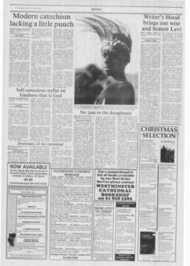Page 2, 10th November 1989
Page 2

Report an error
Noticed an error on this page?If you've noticed an error in this article please click here to report it.
Tags
Share
Related articles
Bishops Reject Cuba Proviso In Namibia Independence
Namibia South Africa's Crushed Colony
Namibia Plea To Pope
The Real Agenda In South Africa
South African Church On Collision Course
Tension grows in Namibia as election result nears
by Dillon Woods
The penultimate bastion of white minority rule in Africa falls this week with independence elections in Namibia. Every inch of South Africa's borders will now face a black-ruled state, a process which begun when independence gradually ntoved south from Ghana in 1957 through Mozambique and Angola in 1975, Zimbabwe in 1980 and now Namibia.
Pretoria had historically protected its apartheid system with a second front beyond its borders. Military and economic destabilisation has been South Africa's way of keeping its
neighbours quiet, but the threat
of sanctions, economic crisis and military defeat in Angola meant that South Africa could no longer remain in Namibia and was forced to implement United Nations Resolution 435 and retreat from the former German colony. Elections will be followed by independence next April. All this is being supervised by the United Nations Technical Assistance Group, UNTAG.
Election fever has gripped the country. Bishop Francis Haushiku whose diocese of Windhoek covers most of Namibia stresses the importimee of the elections for Namibia. Next year's independence will "be very good for our people", he says. Christian Aid journalist Tom Minney commented on the atmosphere all over the country after visiting Namibia recently. "People 1 met in Namibia are very excited about independence", he said. "Many spent years in exile learning skills such as administration, medicine or kindergarten teaching and waiting for this moment. The whole country is keen to start long overdue development work. The churches are vital in bringing the country together and ensuring a good start to independence".
The election results due out on Wednesday, will 'almost certainly bring a victory for SWAPO (South West African People's Organisation), but whether they achieve the necessary two-thirds majority in the Constituent Assembly is unclear.
The main reasons SWAPO might not get the necessary two thirds immediately are the problems there have been with registration, intimidation from the South African army and its surrogate forces, as well as difficulties in teaching people how to vote since many do not speak English. The latter may be overcome by the printing of symbols next to the relevant political parties on the ballot slip, SWAPO's being a first.
Whatever the result, SWAPO is very likely to gain the two-thirds needed after the election, with the help of the numerous smaller parties.
The main right-wing party in the election is the DTA, the Democratic Turnhalle Alliance which stands to win between eight and 15 per cent of the seats.
The DTA is an alliance of right-wing groups similar to the ruling Nationalist Party of South Africa.
Two counter—insurgency forces set up by the South Africans in Namibia were to have been disbanded by UNTAG in the run up to the elections but despite some token motions they still remain intact. This failure is just one of the examples of the limited effect UNTAG and its leader, Martti Alitisaari, have had.
South Africa's attempts to halt a SWAPO victory have not been confined to covert military operations. The South African Foreign Minister, Pik Botha, has claimed that SWAPO are mounting a military campaign. in the 'pre-election period'. This was swiftly denied by both SWAPO and the United Nations.
The Catholic Vicar General of Windhoek, Fr Nordkamp, denied the allegations made by Pretoria. "There is no truth in it at all" he said, "I was shocked like all the other people in this country."
Whatever the outcome of the poll, the honorary secretary of the Namibia Support Commit tee Randolph Vigne, feels the period following the election before next April's independence, will one of some "tension and argument".
blog comments powered by Disqus











